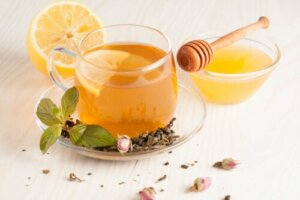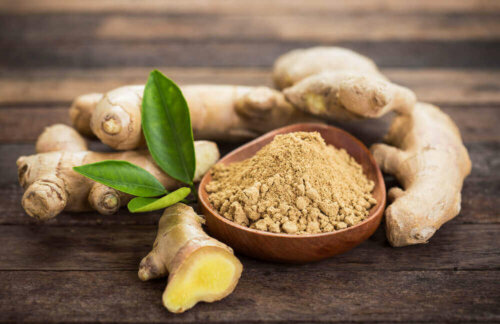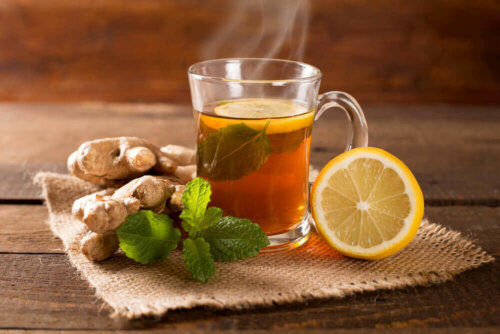A Ginger-Aloe Vera Tisane is a Powerful Drink


Written and verified by psychologist Valeria Sabater
Ginger-aloe vera tea is a natural drink you can easily prepare when you need a different and healthy complement to your diet. Especially if you suffer from fluid retention or other related ailments.
Although mixing these ingredients isn’t common, it can be pleasant when prepared as a hot drink.
Keep in mind that in addition to moisturizing and stimulating urination, hot drinks (tisanes, teas, and infusions) can help you experience a sense of well-being to maintain a healthy lifestyle.
There are those who enjoy it as a tea, without any additional ingredients, and there are those who prepare the infusion as a base for their fruit smoothies. In this sense, we’d like to mention it can taste great with a touch of honey and cinnamon (another aromatic spice with anti-inflammatory properties), or it can be the base of an apple smoothie.
The amazing benefits of ginger and aloe vera

Ginger and aloe tea may help regulate intestinal transit and thereby reduce abdominal swelling. It may also help supplement daily hydration and expel retained fluids.
In addition, it’s believed this drink may also help speed up the metabolism and thus help burn fat. This comes in part because of the properties that both ingredients have:
- Ginger has anti-inflammatory properties, so it can also contribute in some way to relieve swelling of the limbs.
- Aloe vera jelly is mainly composed of water, mucilage, and other carbohydrates, organic acids and salts, enzymes, sterols, triglycerides, amino acids, RNA, trace alkaloids, vitamins, and various minerals.
How to make a ginger-aloe vera tisane
To enjoy the following recipe, we recommend always using fresh ingredients and, as much as possible, avoid adding sugar or other sweeteners.
In case you can’t eat it without a touch of sweetness, add some honey, but keep it in moderation, as this is a food full of calories.
Ingredients
- 1 c. of water
- 1 tbsp. of aloe vera gel
- ½ tsp. of freshly grated ginger
- Optional: 1 tsp. of honey
Preparation
- Firstly, bring some water to a boil.
- Extract some aloe vera gel and wash it with plenty of water to remove the yellow around it.
- Once it’s boiling, add the freshly grated garlic along with the aloe vera. The translucent gel comes from the inside of the plant’s stalks.
- Let it boil for 15 minutes.
- Then, let it sit for another 10 minutes.
- Strain the drink and serve.
- Drink in moderation.

You might be interested in the Signs that Your Body Doesn’t Eliminate Toxins Well
Warning
It’s important to note the warnings of both foods, as both ginger and aloe vera can cause adverse reactions in some cases.
- If you have hypertension, Crohn’s disease, or kidney stones, you shouldn’t take ginger.
- In addition, if you’re pregnant or nursing, you shouldn’t consume ginger or aloe vera.
- If you’re following any treatment for constipation, it isn’t recommended you consume aloe vera, as it can cause diarrhea and dehydration.
- In general, if you’re going to consume aloe vera, always do so in small quantities, as it has laxative properties that can cause discomfort.
- People with diabetes should avoid eating aloe vera, as it may interfere with drug treatment and may also cause hypoglycemia.
- You should also not consume aloe vera if you’re taking a diuretic or anticoagulant medication or are about to undergo surgery, as you could suffer bleeding.
- If you have kidney problems (Crohn’s disease, irritable colon, ulcerative colitis), hemorrhoids, or liver problems, don’t consume aloe vera.
- Children under 12 years of age shouldn’t consume aloe vera.
Now that you know what the warnings of these ingredients are, you can take the necessary precautions.
In case you can’t consume the ginger-aloe vera tisane, we recommend you look for other options and consult your doctor before starting to incorporate them into your diet.
All cited sources were thoroughly reviewed by our team to ensure their quality, reliability, currency, and validity. The bibliography of this article was considered reliable and of academic or scientific accuracy.
- Vogler, B. K., & Ernst, E. (1999). Aloe vera: A systematic review of its clinical effectiveness. British Journal of General Practice.
- Radha, M. H., & Laxmipriya, N. P. (2015). Evaluation of biological properties and clinical effectiveness of Aloe vera: A systematic review. Journal of Traditional and Complementary Medicine. https://doi.org/10.1016/j.jtcme.2014.10.006
- Ali, B. H., Blunden, G., Tanira, M. O., & Nemmar, A. (2008). Some phytochemical, pharmacological and toxicological properties of ginger (Zingiber officinale Roscoe): A review of recent research. Food and Chemical Toxicology. https://doi.org/10.1016/j.fct.2007.09.085
This text is provided for informational purposes only and does not replace consultation with a professional. If in doubt, consult your specialist.








